Students Take Different Paths to Graduation
A record 11,627 students are eligible to graduate from California State University, Northridge this year. Each journey to that degree is as unique as each student, as are their destinations once they leave CSUN.
Some are headed to overseas to realize childhood dreams of professional sports careers. Others are headed into business, law school or teaching. Some are even have plans that could change our understanding of the universe. Below are just some of their stories:
Justin Bracks, B.S. in Astrophysics
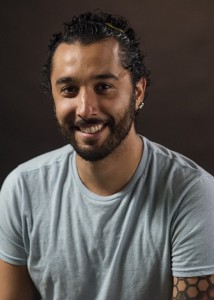
Justin Bracks
Justin Bracks, 31, of Pasadena, will be spending the next several years building a balloon-bourn telescope that will launch several million dollars worth of equipment into the stratosphere from a research station in Antarctica, in an effort to get a better understanding of our universe.
“The telescope will spend several months floating over Antarctica, gathering data. When it lands we’ll have to trek out to wherever it ends up and retrieve our data” said Bracks, who will be doing that research as a doctoral student in astrophysics at the University of Pennsylvania, which has offered him a fellowship to cover the costs of the six years it will take him to get his Ph.D.
The University of Pennsylvania and Antarctica are a far cry from Compton, where he lived as a young child. He started teaching percussion in high school as a way to make money. Once he graduated, he continued working as a musician. When jobs became scarce during the 2008 recession, a friend connected him with a position at a dance studio. When he got a call offering him the job, he almost turned it down.
“But I hadn’t eaten for two days and there was nothing in my refrigerator,” he said. “Hunger can be an amazing motivator.”
Bracks turned that job into a 10-year career as one of Southern California’s leading ballroom dancers and instructors. He designed and launched his own after-school dance program for disadvantaged children, and he opened his own dance studio in Pasadena. A chance conversation a few years ago with one of his dance students, a scientist, ignited his interest in physics.
He enrolled at Moorpark College to get the academic foundation he needed to study the subject and then transferred to CSUN in 2017. He chose CSUN because of physics professor Farisa Morales, who also taught at Moorpark.
“If you have someone willing and able to help you, that you genuinely enjoy being around, you go where they are instead of a world where nobody necessarily likes you and nobody necessarily wants to help you,” Bracks said.
He admitted that transitioning from successful business owner to college student took some adjustment. He didn’t turn his business over to his partner until his junior year at CSUN.
“I went from a sea of extroverts — artists, dancers, writers and actors who were all willing to explore emotionally — to a sea of introverts,” he said. “Introverts often think the worst of people, if only to protect themselves. During my time here, I’ve really been forced to take the introvert’s perspective. I have been forced to listen more. I have learned to survive in a much lower energy environment. Astrophysics and the people I study and work with within astrophysics have made me a more thoughtful person.”
Bracks said he enjoys and looks forward to the challenges astrophysics present him.
“Physics is not intrinsically fun and exciting,” he said. “You are not going to sweaty and get an endorphin high afterwards.
“When I spent 14-hour days as a dancer, at least I got that. Fourteen-hour days working on physics, all you get is anxiety,” he joked.
“Dance was never something I wanted to do; it was something I ended up doing,” he said. “I learned and grew so much during my decade as a ballroom dancer. One of the things I learned and have taken with me is that hunger is an unbelievable, powerful motivator. I am proud of the work I did. But I was not as proud of that as I am of building radio antennas and balloon-born telescopes. Leaving something to do something else that I had never known, that is what I am tremendously proud of.”
Bracks is expected to take part in the College of Science and Mathematics’ commencement ceremony at 6 p.m. on Friday, May 17.
Katharine Charnay, B.A. in Honors English
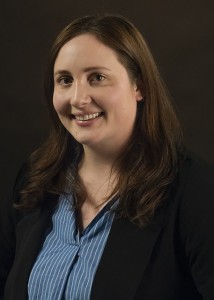
Katharine Charnay
Katharine Charnay admits her journey to CSUN was not a direct one. But along the way, she said, she has learned that she is stronger than she thought and how to turn her mistakes into lessons on which she can build.
“Failure can be used as a tool for learning. You can’t let it define your success,” she said. “You can’t let mental illness define your success. In order to succeed, you need to fail. I have learned from my mistakes, and have grown from them.”
When the 29-year-old Porter Ranch resident graduated from high school more than a decade ago, she headed to Portland State University in Oregon for college.
“But I became really homesick,” she said. “I was having a hard time. So, I came home.”
She ended up going to Santa Monica Community College, where she earned an Associate of Arts degree in liberal arts. With that degree under her belt, she enrolled at CSUN in 2014, eager to start work on a bachelor’s degree.
“I grew up down the street from the school and knew that it was a place where I would be intellectually challenged and satisfy my curiosity to learn about everything under the sun,” she said.
Before she could get fully immersed in her classes, Charnay had to take a medical leave from school to address her struggles with depression and anxiety. When she returned in spring 2017, she was nervous. She reached out to a couple of faculty members to share her concerns.
“What I found was a community that was supportive and that would help me thrive,” she said.
As she settled into the university, she joined a variety of clubs and groups, including the University Ambassadors, through which she volunteered at university events and served as a campus tour guide. While she walked backward and pointed out important buildings on campus, Charnay would share her experiences at CSUN, including her own journey to the campus, and answer questions. She also got a part-time job on campus as a supplemental instructor for freshman English composition classes.
To alleviate stress, she attended open-mic nights at local comedy clubs, where she would turn classroom and life faux pas into a comedy routine.
“I found that I enjoy speaking in front of large groups of people,” she said. “At first, I am nervous, but I enjoy getting people to laugh at something that I found very embarrassing.”
Charnay enrolled at CSUN with the intent of studying psychology. She changed her major a couple times before settling on English because it was “something where I could practice my writing and persuasion abilities. I could learn about different subjects and apply that knowledge,” she said.
She plans to take those skills with her to law school this fall. She is currently weighing offers from four schools. She said she expects to make a decision in a couple of weeks. A factor in her decision is her father, John Charnay, who died earlier this year of prostate cancer. Charnay said he was among her biggest champions. She said he believed in her ability to make a positive difference in people’s lives. She said she hopes to do that as a lawyer.
Charnay is expected to take part in the College of Humanities’ commencement ceremony at 8 a.m. on Monday, May 20.
Marissa Favela, B.S. in Public Health
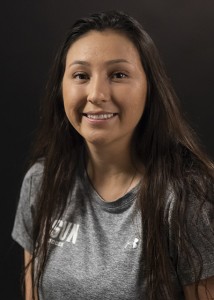
Marissa Favela
When Keith West, head coach of CSUN’s women’s soccer team, looks at Marissa Favela, 21, he said, he sees courage, strength, tenacity, a dedicated student and a talented athlete who, when faced with obstacles, never gives up and has chosen to live life to the fullest.
Favela said West’s faith in her has inspired her to pursue her dreams of playing for a professional soccer team. She hopes to play for a team in London, England. Teams there have a program that would allow her to pursue a graduate degree in nursing while she plays. She won’t know if she got into the program until this summer.
Favela first played soccer at age 5, when her parents enrolled her in an American Youth Soccer Organization team in Diamond Bar, where she grew up. The sport soon became a passion. She spent as much time as possible on the field practicing. She played on club teams and was a member of the Diamond Bar High School girls team.
Her life took an abrupt turn at the start of her junior year of high school, when she was diagnosed with ovarian cancer. Her treatments curtailed her ability to practice and play soccer, and forced her to be temporarily homeschooled while she focused on her health.
When she returned to school at the end of her senior year, Favela said, she didn’t have the same body that had made her a star player in earlier years. She thought the opportunity to be scouted by college recruiters, which usually takes place during the junior year of high school, was gone.
“But somehow Coach West saw me, and he gave me a chance,” Favela said.
West happened to spot Favela playing a game in March of her senior year. He was struck by her natural talent. He said he talked to her high school coach to learn why she hadn’t already received offers from other schools and decided to give her a chance to play for CSUN. Favela enrolled at CSUN that fall, in 2014.
She said the transition to college life was “a little bit of a culture shock.”
“It’s a big school, and I was living on my own for the first time,” she said. “But as I look back, I realize it was a good experience.”
Favela admitted she struggled a little her first year at CSUN. She did not play much as she worked to get her body into shape for Division I play. She also had to adjust to the academic demands of being a public health major.
“Given my own experience with the healthcare industry, I knew that’s what I wanted to study,” she said, noting that her diagnosis of ovarian cancer at age 15 put her in a unique situation. She wasn’t “a kid with cancer,” nor was she an adult.
“I want to be a nurse who specializes in working with someone like me — who wasn’t a kid and wasn’t an adult — because I think teens sometimes get lost in the system,” she said.
She was determined to succeed, both in the classroom and on the pitch. She put in extra hours, in addition to regular practices, to hone her skills. She took advantage of tutoring and advisement programs offered by Matador Athletics to ensure she kept her grades up.
Over the past four years, she managed to successfully juggle the demands of her classes while being considered one of the top scorers in the Big West Conference. She helped CSUN advance to the 2017 Big West Tournament Championship game, was invited to be part of the All-Big West team and is currently eighth in CSUN history in scoring. She also has been cancer free for nearly six years.
Favela is expected to take part in the College of Health and Human Development’s commencement ceremony at 6 p.m. on Monday, May 20.
Oshae C. Rodgers, B.A. in History, with a minor in Africana Studies
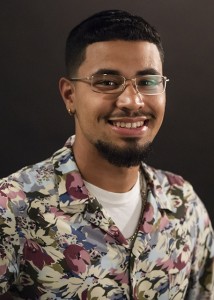
Oshae C. Rodgers
Oshae C. Rodgers, 21, of North Hollywood, is an ardent believer in appreciating history — your personal history, that of your community and that of the greater society.
“A lot of times, we’re learning the narrative of a homogeneous community,” Rodgers said. “But when you’re in high school or in middle school, you want to know ‘my’ narrative. You want to know about people ‘who look like me.’
“If I don’t know my history, then I truly don’t know my soul. Then I cannot understand how we all connect, because everything that happened before is influencing things now,” he said. “If we want to understand now and how to move forward, then we need to understand the past.”
Rodgers plans to turn that passion for history into a teaching career, first at a middle or high school and eventually a college. He recognizes that being a teacher is not easy, ‘but if I can touch just one life, and they go on and touch another life, then my job is done,” he said.
Passion for knowing about the past runs in his family. His grandfather Kenneth W. Rodgers, Sr., wrote about the experiences of his friends and family as urban African Americans in the 1960s and ‘70s in the book “Not My Shadow: A True African American Story.” His uncle, Kenneth Rodgers, teaches history, among other subjects, at Synergy Quantum Academy in South Los Angeles.
His uncle holds a special place in Rodgers’ heart. Rodgers grew up in an impoverished neighborhood in Albuquerque, New Mexico. By the time he reached his senior year in high school, things were rocky at home and he ended up camping out in a sleeping bag in a store room.
His uncle, hearing about his plight, invited Rodgers to live with him in North Hollywood. His only demands: Rodgers continue his education and get a job. Before he left Albuquerque, Rodgers met with a high school counselor who implied he had too many strikes against him to succeed in college.
Rodgers was 17 and just months shy of his high school graduation when he arrived in California. Determined to get his diploma on time, he crammed more than a year of studies into just a few months of night classes to meet California’s high school graduation requirements.
He also toured local college campuses, including CSUN.
He felt “like a number” on some of the tours, he said, “but when I got to CSUN, someone sat down with me and said ‘Let’s look at your credits here and in Albuquerque, and see how we can get you into CSUN.’ It was very personal, and I immediately knew I was home.”
Rodgers enrolled at CSUN in 2014 and threw himself into his studies, reveling in the intellectual exchanges with his peers and professors. He was named a University Scholar, part of a cohort of academically achieving students. In 2016, he received a CSU Trustee Award for Outstanding Academic Achievement for demonstrating superior academic performance, personal accomplishments, community service and financial need. He also started writing a book, a semi-memoir that he hopes will serve as inspiration for other young people.
Rodgers starts graduate school in the fall at UCLA, where he will be working on a master’s in education, with an emphasis in social justice, as well as a teaching credential. But first, he plans to return to Albuquerque this summer for a family graduation celebration. While there, he plans to visit a certain high school counselor who doubted his college dreams.
Rodgers is expected to take part in the College of Social and Behavioral Sciences’ commencement ceremony at 8 a.m. on Saturday, May 18.
Argin Yadegarian, B.S. in Accounting
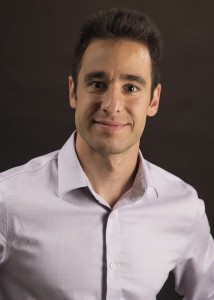
Argin Yadegarian
Argin Yadegarian, 30, of Glendale, hasn’t received his diploma yet, but he is already making plans to give back to the institution that he credits with helping him achieve his dreams.
He is thinking about creating a scholarship at CSUN, once he’s established himself as a businessman, to ensure that future students like him — an immigrant from a low-income family — have the support and encouragement they need to succeed.
“It’s been on my mind for a while,” he said. “I’m not just going to let it lie. I will make sure it happens.”
Yadegarian was 17 and living in his native Iran when his father died. Shortly thereafter, his brother, who is 10 years older and had studied engineering, moved to the United States for a job. It fell on Yadegarian’s shoulders to support himself and his mother. He found a job as a lifeguard and taught swimming to young children.
“I loved working with young children, but I dreamed of going to college and working in business,” he said. “That wasn’t possible in my home country. We just didn’t have the money or connections.”
After his brother took a job in the California, he offered to bring Yadegarian and their mother to the U.S. That was six years ago.
Yadegarian was determined to take advantage of the opportunities his new home presented. He enrolled at Glendale Community College to learn English and then took the classes necessary to transfer to a four-year institution to study accounting.
“Accounting is the language of business,” he said. “If you want to be successful in the world of business, you need to read a financial statement and know how the business works at its core. Accounting is the foundation of all that.”
He chose CSUN, he said, because its Department of Accounting is considered one of the best in the state.
From the start, he said, he found a supportive environment at the university — from the staff in the David Nazarian College of Business and Economics’ Educational Opportunity Program (EOP) to classmates in the college’s business fraternity, Beta Alpha Psi, fellow volunteers at CSUN’s Volunteer Income Tax Assistance (VITA) Clinic, and faculty in the accounting department. Someone was always willing to help him navigate any obstacle he encountered.
A chance conversation with CSUN accounting alumnus Charles Noski and his wife, Lisa, at a university dinner in 2017 led to a scholarship that covered Yadegarian’s educational expenses during his time at the university. His eyes teared up as he recounted the story.
“It was just so very huge in my life,” said Yadegarian, who cares for h is ailing mother when he is not at school. “I am an immigrant. I come from a low-income family. And I can go to college because someone believed in me and gave me the financial support so that I could go through the program. I am truly grateful for what the Noskis have done for me. I cannot thank him enough for believing in me. What I can do is pay it forward. To let someone else like me know that there are people who believe in them.”
Yadegarian has a job waiting for him with the international professional services firm Ernst & Young when he graduates. He is expected to take part in the commencement ceremony for the David Nazarian College of Business and Economics at 8 a.m. on Sunday, May 19.

 experience
experience